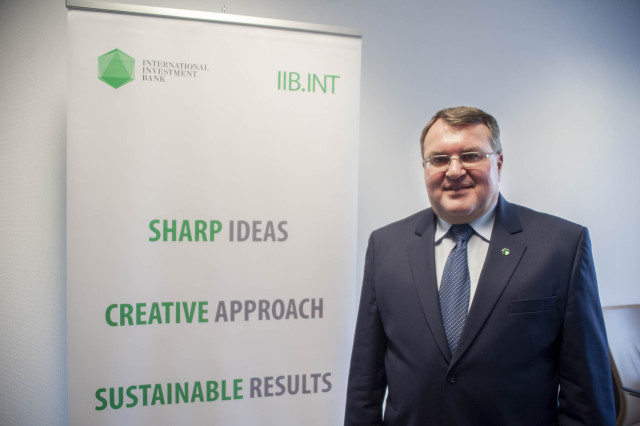The newly appointed Deputy Chairperson of IIB Management Board Imre Laszlóczki reflects on the Bank's strategic development in his first interview to Portfolio.hu

International Investment Bank will invest in car industry, agriculture, and tourism in Hungary. IIB has moved to Budapest, and has a new incumbent Hungarian Deputy Chairperson of the Management Board. We asked Imre Laszlóczki about business, as well as diplomacy.
International Investment Bank (IIB) appointed a new Hungarian Deputy Chairperson of the Management Board in September. Those with little familiarity concerning the operation of the investment bank, owned by several countries, may find it surprising that Imre Laszlóczki had a serious career in diplomacy prior to occupying the position of IIB Management Board Member. Portfolio was first to talk to Imre Laszlóczki and find out what development projects really mean in practice for IIB, and which areas they see potential in, and - throughout the conversation - we also touched upon questions of diplomacy associated to their relocation to Budapest.
For more than 30 years you worked in foreign affairs filling important positions in the Ministry of Foreign Affairs and Trade. You have a typical career diplomat’s history behind you. What brings you into banking?
As a diplomat, and public official I have been involved in matters of international economic cooperation, attracting investment, and played a role in establishing investment funds.
The second largest shareholder of International Investment Bank is Hungary, and the financial institution has been operating here in Budapest for a number of months now, so it is quite plausible that the Hungarian government wishes to have a say also in the bank’s operations. Bank management were unanimous in their intention to find a Hungarian professional to join the Management Board. The final decision concerning the candidate was made following a multi-round consultation process between the government and the management.
The unanimous decision concerning my appointment was made in mid-September. It is important to know that each member country delegates one member in the Board of Directors, and the Board of Governors. The member of the later is logically the incumbent Minister of Finance.
At IIB you are in charge of the bank’s strategic development. What does that mean in practice? What development projects is the bank going to join?
IIB is one of the oldest development institutions looking back on nearly 50 years of operation. The working principle in practice is that we seek out our own niche among our peers. Large international development institutions do not reach out for ‘small change’, i.e. they do not necessarily apply for projects under a given size, while we are willing to find also smaller projects between EUR 15-30 million that have great potential.
Our assistance so far provided to Hungary equals close to EUR 200 million including closed transactions. Our current portfolio amounts to about EUR 76 million, while project portfolio pipeline is totaling approximately EUR 40 million. Projects we are currently approaching, that is those where negotiations are already in progress are worth EUR 90 million. Our plans include investment in a number of larger projects.
As regards potential areas in Hungary we pay special attention to the car industry, and we see great opportunity in developing and upgrading spare part suppliers business. Agriculture is also an evergreen area, one in which everyone is always pleased to invest. We find the food industry, and tourism also very promising.
The Hungarian stake in the Bank is around 15%, while the loan portfolio a bit exceeds 8%. The intentions of the government, and the Bank is to bring these numbers closer to each other.
According to an announcement last week IIB plans to issue a HUF bond of a face value of HUF 10,000 to the Hungarian capital market. The total value to be issued is planned to equal HUF 15 billion, and the security would have a fixed interest rate, and a maturity of 3 years. When can subscription begin, and what is the purpose of the financial institution with the issuance? How would you evaluate the previous HUF bond issuance?
Our first issuance that took place in spring – also denominated in HUF – was truly successful, and it was subject to Hungarian legislation. That time we issued bonds worth HUF 24.7 billion twice oversubscribed. Investors like the Hungarian bond issued by IIB partly because it is available for repo, and it offers a higher yield than a government bond. The new issuance will contribute to the development of the Hungarian capital market too. It’s important to underline that with the new placement IIB still remains the only multilateral international development institution to issue its bonds in HUF in compliance with Hungarian legislation.
Standard & Poor's and Fitch Ratings recently upgraded the bank’s ratings. To what extent is that due to your relocation to Budapest?
It is a significant advantage that the Bank is member of the elite club of category A banks. Out of the four credit raters three rated us A, and one BBB+ with positive outlook. Recently there was a bond issuance in the Czech Republic, and the second one is coming up in Hungary next week, and it is already apparent that partly on account of the upward ratings we will be able to have access to funds significantly cheaper. The costs of our previous issue turned out to be our lowest ever. We hope that trend continues.
I need to add that the Bank received its new Hungarian SWIFT code a few days ago, which practically completes the relocation process, so now we work with a Budapest head office, and European tax number. The IIB is the first and only multilateral development bank with its headquarters here in Central Eastern Europe. That also adds to the importance of the region.
IIB’ relocation to Budapest sent shockwaves through international politics; recently e.g. even American senators protested against it. One of the key issues was if bank staff are automatically granted diplomatic immunity.
We do not comment other countries’ questions of domestic and foreign policy. Our mission is to operate the business, support the development.
As regards diplomatic immunity IIB receives no more than the EBRD in UK or the World Bank in US. That is a requirement for an international financial institution like ours, and as it happens it is all subject to Vienna Convention.
The UN has recognized IIB as an international organization, and diplomatic immunity automatically comes with that recognition. If the Bank had relocated its head office not to Hungary but some other country, we would have received that same immunity.
It is also commonly known that the Hungarian government was looking for a building for the bank in downtown Budapest. Is your relocation on the agenda or do you plan to stay here in district 13?
We are constantly reviewing options. Next year is our 50th anniversary, which we would like to celebrate in a new head office.


